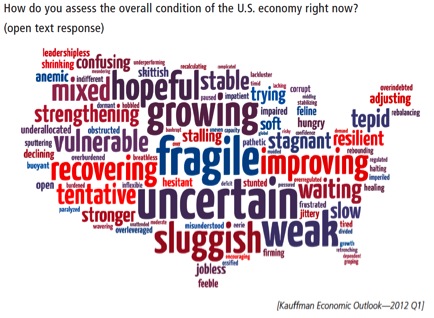
by Matt O’Brien
Economists can tell us a lot about markets where there’s perfect competition, but what about the real world? You know, that place where there are only a few big companies fighting — or maybe not — against each other. What should the government do about those kind of businesses?
The answer, French economist Jean Tirole told us, is complicated. And his decades of work explaining how much so, which has become the textbook for regulators everywhere, has won him the 2014 Nobel Prize in Economics. It’s a story about what economists call asymmetric information, game theory, and contract theory.
Here’s what those all mean:
Asymmetric Information. A lot of markets are natural monopolies. That means it costs less for one company, rather than many, to make something, because you have to spend so much upfront to enter the market. Broadband is a classic example: once the first-mover has built all the infrastructure it needs, it’s not worth it for anyone else to even try to. If they do, the incumbent company can just temporarily lower prices until it’s not profitable enough for the other to continue.
But governments don’t like monopolies, natural or otherwise, so sometimes they break them up into highly-regulated oligopolies instead. That is, a few companies dominating the market instead of just one. There’s still a problem though. How exactly should the government regulate them? It wants to get rid of these companies’ excess profits without getting rid of their profit motive altogether. In other words, it doesn’t want big companies to gouge their customers, but it does want them to keep investing in a better customer experience. The easy answer is put caps on what they can charge — which makes them try to boost profits by cutting costs — but that doesn’t always stop them from making quasi-monopolistic profits.
And that gets at the real problem: the government doesn’t know how much it costs these companies to make things. Or, in econospeak, there is asymmetric information about the cost of production. If the government knew what the companies do, it could set the “right” price on any cap. But it doesn’t, and it can’t. That’s why Tirole just looked for a way around this issue—not a solution, but an answer.
Game theory. Now whatever regulatory system the government comes up with doesn’t just change how companies deal with it. That system changes how companies deal with each other, too. There isn’t, in other words, an invisible hand guiding everybody’s decisions, but rather rules of the game. And, depending on those rules, my decision might change based on what I think yours will be.
Here’s an example that doesn’t have to do with regulation per se. Suppose you want to dissuade other companies from coming into your quasi-monopolistic market. What should you do? Well, as Tirole showed, strategic concerns can trump economic ones. If new investments let you cut your marginal costs, then you should over-invest to make your margins so razor-thin that it wouldn’t be profitable enough for anyone to even bother trying. This same kind of logic—driven not by supply-and-demand, but by competition—applies to the government’s rules, too.
Contract theory. This is where things get tricky. The government usually can’t strike a long-term deal with companies, so they have to resort to a series of short-term ones instead. But if companies fear that the government will clamp down on big profits today with tougher contracts tomorrow, they might not work as hard as they could. So the second-best contract—which might be the best we can do—will let firms make more than they “should.” But Tirole showed that, sometimes, the government can do better if it offers companies a choice of contracts. This forces firms, at least indirectly, to reveal whether they have high or low costs, since different contracts will be better for them depending on that.
***
Tirole, of course, has done much, much more than just apply these ideas to regulation. He’s shown how firms that have a monopoly in one industry can also get one in a related industry by buying up a customer company. Or that “platform markets,” where a middleman connects two groups to sell access to one to the other, might be best off “undercharging” (or not at all) one of them. Think about bars that offer free “lady’s night” to bring more women and men together; social networks that let you sign up for free to bring more eyeballs to advertisers; or even newspaper that sell copies for less to do the same.
In short, Tirole’s well-deserved Nobel Prize is a triumph for the idea that economic theory can do better than telling us about perfect markets that don’t exist. It can tell us about the world as it really is. The answers aren’t as sweeping, but they’re much more important.
Related Posts
73
Follow up of my post on BIG COMPANIES NOW HAVE A HAND IN THE COLLABORATIVE ECONOMY Here is one picture.
Tags: economy, companies, big
67
http://www.teslamotors.com/sites/default/files/blog_attachments/gigafactory.pdf
Tags: economy
67
Greek debt tracker As the government in Athens haggles with its lenders over economic reforms,Greece is running out of money. Here is what it owes in the upcoming months. http://www.ft.com/ig/sites/2015/greek-debt-monitor/
Tags: government, economy
66
This is a story about ARM Holdings (ARMH), the mobile technology company. But before it gets going, here are a few things you need to know: 1. ARM is a company made up mostly of chip engineers. They design parts of chips—such as graphics and communication bits—and they design entire…
Tags: company, economy
66
Why do we say so ? Easy money policies of recent years could lead to big problems. Warning indicators like the significant number of original general public offerings of organizations that are unprofitable, and substantial degrees of financial debt issued to firms, often with weak credit score.
Tags: firms, big, economy

